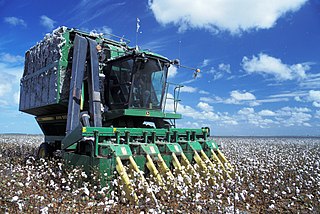
Oxnard is a city in Ventura County in the U.S. state of California, United States. On California's South Coast, it is the most populous city in Ventura County and the 22nd-most-populous city in California. Incorporated in 1903, Oxnard lies approximately 60 miles (97 km) west of downtown Los Angeles and is part of the larger Greater Los Angeles area.

The Correctional Service of Canada, also known as Correctional Service Canada or Corrections Canada, is the Canadian federal government agency responsible for the incarceration and rehabilitation of convicted criminal offenders sentenced to two years or more. The agency has its headquarters in Ottawa, Ontario.

Mechanised agriculture or agricultural mechanization is the use of machinery and equipment, ranging from simple and basic hand tools to more sophisticated, motorized equipment and machinery, to perform agricultural operations. In modern times, powered machinery has replaced many farm task formerly carried out by manual labour or by working animals such as oxen, horses and mules.

The economy of the State of California is the largest in the United States, with a $3.89 trillion gross state product (GSP) as of 2023. It is the largest sub-national economy in the world. If California were a sovereign nation (2024), it would rank in terms of nominal GDP as the world's fifth largest economy, ahead of both India and the United Kingdom. Additionally, California's Silicon Valley is home to some of the world's most valuable technology companies, including Apple, Alphabet, and Nvidia. In total, 11 of the Fortune 100 companies and 53 of the Fortune 500 companies are headquartered in California.

Environmental Impact assessment (EIA) is the assessment of the environmental consequences of a plan, policy, program, or actual projects prior to the decision to move forward with the proposed action. In this context, the term "environmental impact assessment" is usually used when applied to actual projects by individuals or companies and the term "strategic environmental assessment" (SEA) applies to policies, plans and programmes most often proposed by organs of state. It is a tool of environmental management forming a part of project approval and decision-making. Environmental assessments may be governed by rules of administrative procedure regarding public participation and documentation of decision making, and may be subject to judicial review.

The California Department of Water Resources (DWR) is part of the California Natural Resources Agency and is responsible for the management and regulation of the State of California's water usage. The department was created in 1956 by Governor Goodwin Knight following severe flooding across Northern California in 1955, where they combined the Division of Water Resources of the Department of Public Works with the State Engineer's Office, the Water Project Authority, and the State Water Resources Board. It is headquartered in Sacramento.

The California State Coastal Conservancy is a non-regulatory state agency in California established in 1976 to enhance coastal resources and public access to the coast. The CSCC is a department of the California Natural Resources Agency. The agency's work is conducted along the entirety of the California coast, including the interior San Francisco Bay and is responsible for the planning and coordination of federal land sales to acquire into state land as well as award grant funding for improvement projects. The Board of Directors for the agency is made up of seven members who are appointed by the Governor of California and approved by the California Legislature, members of the California State Assembly and California State Senate engage and provide oversight within their legislative capacity.

The California Energy Commission, formally the Energy Resources Conservation and Development Commission, is the primary energy policy and planning agency for California.

Driscoll's is a California-based seller of fresh strawberries and other berries. It is a fourth-generation family business that has been in the Reiter and Driscoll families since the late 1800s. In 2017, it controlled roughly one-third of the $6 billion U.S. berry market. Headquartered in Watsonville, California, Driscoll's develops proprietary breeds of berries and then licenses them exclusively through approved growers.
The California Walnut Board or Walnut Marketing Board, founded in 1933, supports the California walnut industry. The organization was originally known as the Walnut Control Board, changing its name to the Walnut Marketing Board in 1962 and to the California Walnut Board in 2008. Its formation was authorized by the Agricultural Adjustment Act (AAA).

A Cannabis Social Club (CSC), sometimes called Cannabis Club, Cannabis Association, or Teapad, is a type of cannabis retail outlet, an industry model for regulated cannabis organised as non-profit cooperatives in which cannabis is cultivated, shared, and enjoyed collectively, usually for the purpose of relaxing or for social communion.

In California, the Employment Development Department (EDD) is a department of the state government that administers Unemployment Insurance (UI), Disability Insurance (DI), and Paid Family Leave (PFL) programs. The department also provides employment service programs and collects the state's labor market information and employment data. EDD is one of California's three major taxation agencies, alongside California Department of Tax and Fee Administration and the Franchise Tax Board. In addition to collecting unemployment insurance taxes, the department administers the reporting, collection, and enforcement of the state's personal income taxes.

California's interconnected water system serves almost 40 million people and irrigates over 5,680,000 acres (2,300,000 ha) of farmland. As the world's largest, most productive, and potentially most controversial water system, it manages over 40 million acre-feet (49 km3) of water per year. Use of available water averages 50% environmental, 40% agricultural and 10% urban, though this varies considerably by region and between wet and dry years. In wet years, "environmental" water averages 61%, while in dry years it averages 41%, and can be even lower in critically dry years.

Jeffrey Steven White is a senior United States district judge of the United States District Court for the Northern District of California.

The economy of the state of Florida is the fourth-largest in the United States, with a $1.4 trillion gross state product (GSP) as of 2022. If Florida were a sovereign nation (2022), it would rank as the world's 16th-largest economy according to the International Monetary Fund, ahead of Indonesia and behind Mexico. Agriculture, tourism, industry, construction, international banking, biomedical and life sciences, healthcare research, simulation training, aerospace and defense, and commercial space travel contribute to the state's economy.
The California Film Commission (CFC) was founded in 1985 by then California Governor George Deukmejian to act in an economic development capacity for the state. It is a part of the California Trade and Commerce Agency, formerly the Business, Transportation, and Housing Agency. Its purpose is to enhance California's position as the location of choice for motion picture, television and commercial production.
Joseph Miles Reiter is an American farmer and entrepreneur, and the outgoing CEO of Driscoll's, Inc., a global agribusiness specializing in fresh year-round berry production.
Delta Conveyance Project, formerly known as California Water Fix and Eco Restore or the Bay Delta Conservation Plan, is a $15 billion plan proposed by Governor Jerry Brown and the California Department of Water Resources to build a 36 foot diameter tunnel to carry fresh water from the Sacramento River southward under the Sacramento-San Joaquin Delta to Bethany Reservoir for use by the State Water Project and the Central Valley Project.

Agriculture is a significant sector in California's economy, producing nearly US$50 billion in revenue in 2018. There are more than 400 commodity crops grown across California, including a significant portion of all fruits, vegetables, and nuts in the United States. In 2017, there were 77,100 unique farms and ranches in the state, operating across 25.3 million acres of land. The average farm size was 328 acres (133 ha), significantly less than the average farm size in the U.S. of 444 acres (180 ha).

Strawberries in the United States are almost entirely grown in California – 86% of fresh and 98% of frozen in 2017 – with Florida a distant second. Of that 30.0% was from Monterey, 28.6% from Ventura, 20.0% from Santa Barbara, 10.0% from San Luis Obispo, and 9.2% from Santa Cruz. The Watsonville/Salinas strawberry zone in Santa Cruz/Monterey, and the Oxnard zone in Ventura, contribute heavily to those concentrations.

















